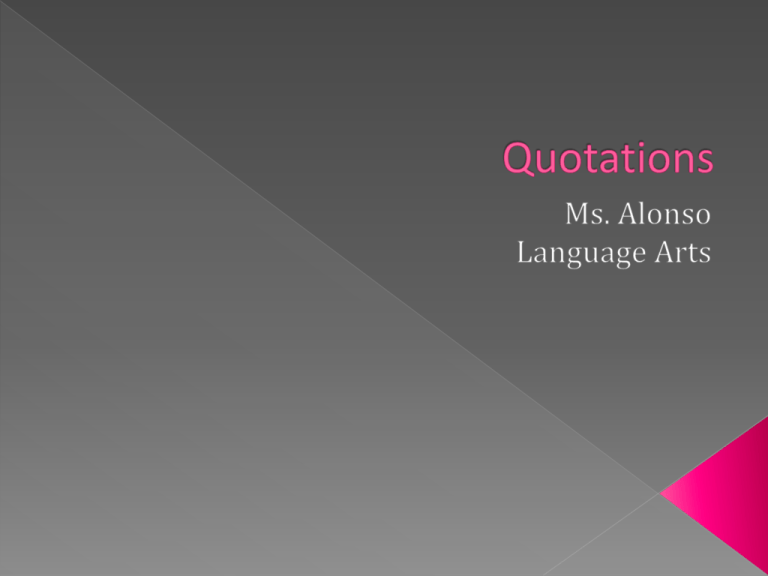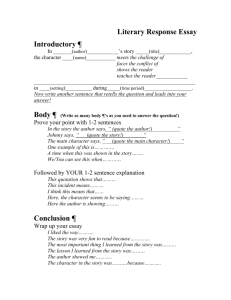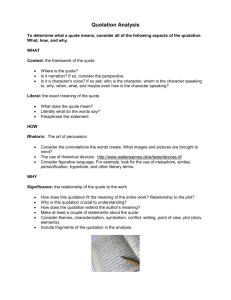Integrating Quotations
advertisement

Does the quote fit into my argument? › How? › Does it fit where I am trying to include it? Is it merely descriptive? › If so, consider paraphrasing the quote instead of quoting it directly. Taking the exact words from an original source is called quoting. You should quote material when you believe the way the original author expresses an idea is the most effective means of communicating the point you want to make. If you want to borrow an idea from an author, but do not need his or her exact words, you should try paraphrasing instead of quoting. If you think it’s important to quote something, an excellent rule of thumb is that for every line you quote, you should have at least two lines analyzing it. At the end of your quote in parenthesis, you should have the page you got the material from at the very least. When Scout asks Atticus to get rid of Calpurnia, he says he has “no intention of getting rid of her now or ever” (pg. 24). All quotes must be introduced. The way you introduce them shows your mastery of quotation and your understanding of the material. If this is the first time you refer to a source, you must include the name of the work, the name of the author (or character if this is a literary analysis). › Example: In an essay presented at an Asian Studies conference held at Duke University, Sheldon Garon analyzes the relation of state, laborunions, and small businesses in Japan between the 1950s and 1980’s. › Here, you will incorporate a quote into a sentence that you have already begun: 1. Realizing how hurt Piggy is, Ralph can’t decide “between the two courses of apology or further insult” (pg.2) 2. Smokers continually “infringe on the rights of others when they light up in confined places such as elevators and restrooms” (pg.4). 3. Evidence of a plane crash was “visible in the trees; there were the splintered trunks and then the drag, leaving only a fringe of palms between the scar and the sea” (pg. 24) 4. Americans must learn “that envy is ignorance; that imitation is suicide” (pg.30) Use one line from the lyrics to a popular song and interpret them. Use appropriate songs, please. › Example: One Direction is talking about stage lights and camera lights flashing when they say “all these lights can’t blind me” in their hit single Drag Me Down which could be taken to mean that fame doesn’t phase them. Introduce the quote with a complete sentence. This is what most students are doing when they “plop” quotes into a paper. All you need to do is put a colon after the sentence preceding the quote and begin the quote with a capital letter. This time the quote must be a complete sentence. 1. 2. 3. Ralph’s common sense is evident in the novel: “If a ship comes near the island they may not notice us. So we must make. . . a fire.” Second hand smoke has been proven lethal: “Cases are now being documented where people whose parents smoked are getting lung cancer when they themselves have not smoked” (“Truth” 4). Emerson believes passionately in individualism: “Whoso would be a man must be a nonconformist.” Example of direct quotation in the beginning of a paragraph (from an essay about effective teaching strategies): › Regarding research by Evertson and Emmer, Borich states, “Effective teachers attached assignments directly to the end of an in-class activity, avoiding awkward pauses or even the need for a transition. The assignment appeared to students as a logical extension of what was already taking place” (128). The timing of assignments, then, contributes to their effectiveness; if assignments are linked together naturally, then students are more likely to see the relevance. In my observation of this teacher, the homework assignments do immediately follow the lessons to which they pertain. They mimic the types of activities and discussions (as noted on agenda) that students were engaged in less than 20 minutes prior. The students are actively engaged in preparing for their homework and they seem to understand its purpose. INTRODUCE DIRECT QUOTATION: Regarding research by Evertson and Emmer, Borich states, STATE DIRECT QUOTATION: “Effective teachers attached assignments directly to the end of an inclass activity, avoiding awkward pauses or even the need for a transition. The assignment appeared to students as a logical extension of what was already taking place” (128). EXPLAIN WHAT THE QUOTATION MEANS: The timing of assignments, then, contributes to their effectiveness; if assignments are linked together naturally, then students are more likely to see the relevance. SHOW HOW IT SUPPORTS THE MAIN POINT (THESIS): In my observation of this teacher, the homework assignments do immediately follow the lessons to which they pertain. They mimic the types of activities and discussions (as noted on agenda) that students were engaged in less than 20 minutes prior. Make a statement about what the author is trying to say while using direct quotation to emphasize your point. Do this for 2 of the following. find a way around the laws." . "I find that the harder I work, the more luck I seem to have." › "In the End, we will remember not the words of our enemies, but the silence of our friends." › George Bernard Shaw (1856-1950) "But at my back I always hear Time's winged chariot hurrying near." › Andrew Marvell (1621-1678) "Good people do not need laws to tell them to act responsibly, while bad people will Frank Lloyd Wright (1868-1959) "I'm all in favor of keeping dangerous weapons out of the hands of fools. Let's start with typewriters." › Edward George Bulwer-Lytton (1803-1873) "Many wealthy people are little more than janitors of their possessions." › H. G. Wells (1866-1946) "Talent does what it can; genius does what it must." › Salvador Dali (1904-1989) "If you can't get rid of the skeleton in your closet, you'd best teach it to dance." › Plato (427-347 B.C.) "Human history becomes more and more a race between education and catastrophe." › Henry Ford (1863-1947) "The only difference between me and a madman is that I'm not mad." › Martin Luther King Jr. (1929-1968) "Whether you think that you can, or that you can't, you are usually right." › Thomas Jefferson (1743-1826) › Frank Lloyd Wright (1868-1959) "Some cause happiness wherever they go; others, whenever they go." › Oscar Wilde (1854-1900)



